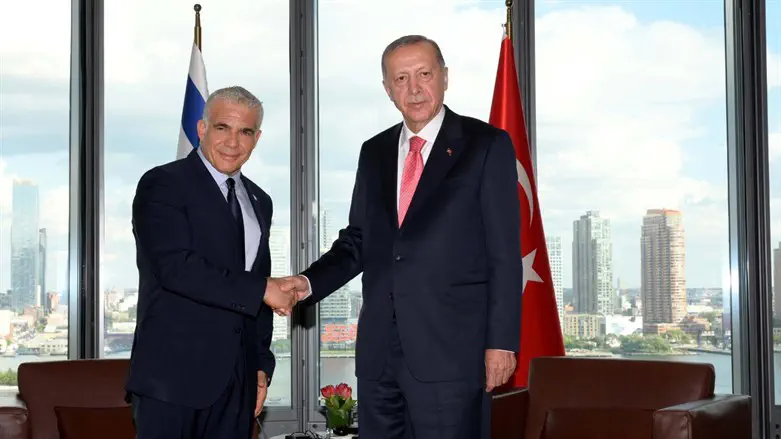
Prime Minister Yair Lapid landed in New York on Tuesday, ahead of his participation in the United Nations Assembly, where he is expected to give a speech on Thursday. As of right now, the time of his speech has not yet been finalized and attempts are being made to move it up.
Lapid on Tuesday held a meeting with Turkish President Recep Tayyip Erdogan. There has not been a meeting between the Prime Minister of Israel and the President of Turkey since 2008, when then-Prime Minister Olmert met with Erdogan.
This is the first meeting between a Prime Minister of Israel and a President of Turkey since the announcement of the restoration of full diplomatic representation and the return of Ambassadors and Consuls-General to Israel and Turkey.
Prime Minister Lapid commended the increased level of representation as well as the appointment of a new Israeli Ambassador to Turkey, Irit Lillian.
The two leaders discussed the fight against terrorism in Israel and generally. Prime Minister Lapid thanked President Erdogan for intelligence cooperation at the time of Iran’s attempts to carry out terrorist attacks on Turkish soil.
The Prime Minister also brought up the issue of missing and captive Israelis, and the importance of bringing them home.
Additionally, the two leaders discussed economic and energy cooperation between Israel and Turkey, as well as regional developments.
The Prime Minister also positively noted the restoration of Israeli flights to Turkey, and said this step will contribute greatly to strengthening tourism between the nations.
Earlier on Tuesday, Lapid met King Abdullah II of Jordan on the sidelines of the United Nations General Assembly in New York City.
The two leaders discussed the security situation in Judea and Samaria, which has seen a number of terrorist attacks in recent months.
Before his meeting with Lapid, the Jordanian monarch used his address at the UN General Assembly to extol Jordan's role as the custodian of Muslim holy sites in Jerusalem and to warn against any changes to the status quo on the Temple Mount.
“The future of Jerusalem is an urgent concern. The city is holy to billions of Muslims, Christians and Jews around the world. Undermining Jerusalem’s legal and historical status quo triggers global tensions and deepens religious divides," Abdullah said.
He added: “The holy city must not be a place for hatred and division and as custodians of Jerusalem’s Muslim and holy sites we are committed to protecting the historical and legal status quo and to their safety and future.”